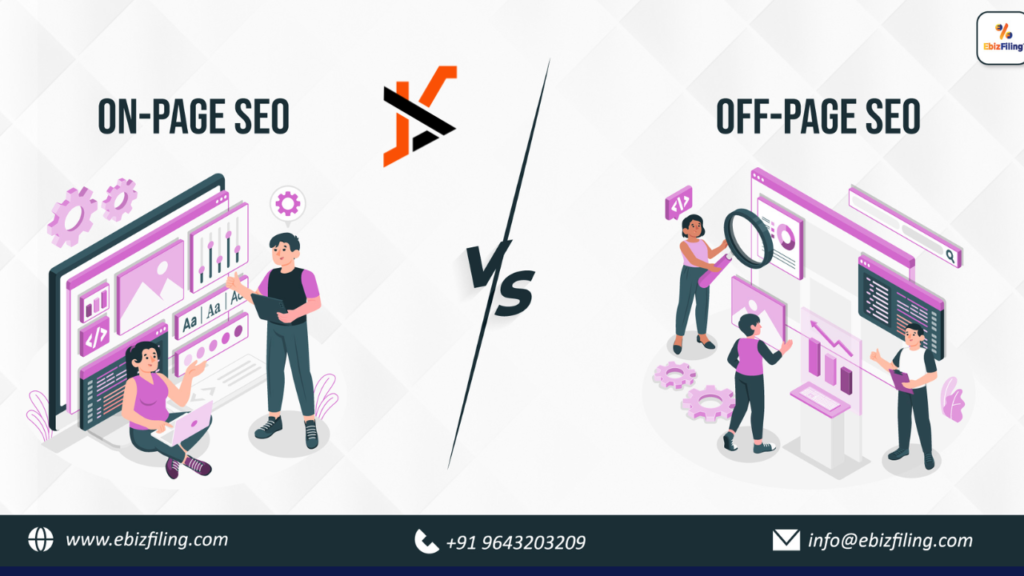SEO isn’t just about throwing some keywords into your content and hoping for the best. There are two major parts to it – on-page SEO and off-page SEO. Both matter. A lot. But they work in different ways.
- On-Page SEO is all about optimising your actual website – the stuff you can control.
- Off-Page SEO is about constructing your site’s reputation and authority across the web.
You need both to rank well. But which SEO is more important? Let’s break it down.
How Each Type of SEO Affects Rankings
Think of SEO like a game. On-page SEO gets you into the competition – it tells search engines what your content is about. Off-page SEO helps you win – it shows search engines that your content is trustworthy and valuable.
- On-Page SEO = Helps search engines understand your website.
- Off-Page SEO = Helps search engines decide how important your site is.
One without the other? Won’t get you far.
What is On-Page SEO?
On-page SEO is everything you do on your own website to make it search-friendly. It includes:
- Title Tags – The clickable blue links in search results.
- Headings (H1, H2, etc.) – Organises content for search engines and readers.
- URLs – Keep them short, clear, and relevant.
- Alt Text for Images – Helps Google understand what your images are about.
- Page Speed – Nobody waits for slow sites to load.
- Mobile-Friendliness – Your site needs to work perfectly on phones.
- Internal Links – Linking to other pages on your site helps Google and users navigate.
- Schema Markup – Gives Google more context about your page (think star ratings in search results).
All of these things make your site easier to read – for both users and search engines. If search engines can understand your content better, they can rank it better.
On-Page SEO Checklist
Want better rankings? Here’s a quick checklist to make sure your on-page SEO is solid:
Write clear, engaging title tags (under 60 characters).
Use headings properly – H1 for main titles, H2s and H3s for subheadings.
Keep URLs short and keyword-focused (but don’t force it).
Add alt text to images – describe them naturally.
Make your website load fast (Google PageSpeed Insights can help).
Ensure mobile-friendliness—test your site on different devices.
Link to other pages on your site to keep users engaged.
Use structured data (schema markup) to improve search visibility.
On-page SEO is fully under your control. Fix these things first before worrying about anything else.
What is Off-Page SEO?
Off-page SEO is about building your website’s authority and reputation. It happens outside of your website, but it affects your rankings. The biggest factor? Backlinks.
A backlink is when another website links to your site. Search engines see these links as votes of confidence. The more high-quality backlinks you have, the more trustworthy your site appears.
How to Improve Off-Page SEO
- Backlinks – Get links from trusted, high-quality websites.
- Social Media – Shares and mentions help boost brand visibility.
- Guest Blogging – Write for other sites to earn backlinks.
- Influencer Marketing – Partner with influencers to expand your reach.
- Unlinked Brand Mentions – Find sites that mention your brand but don’t link to you – then ask them for a link.
Off-page SEO takes time and effort, but it’s what pushes your rankings higher in competitive spaces.
How Backlinks Work in SEO
Imagine filling a bathtub with rubber duckies (each duck is a page on your website). The more water (backlinks) you add, the higher the ducks rise.
Websites like Wikipedia rank well for almost everything because they have so many backlinks. Their “bathtub” is overflowing with water.
But not all backlinks are good. If your site gets links from spammy, low-quality sites, Google could penalise you. Focus on quality over quantity.
Is On-Page or Off-Page SEO More Important?
That’s like asking, what’s more important: a house’s foundation or the roof?
You need both.
- On-Page SEO tells search engines what your content is about.
- Off-Page SEO tells search engines why your content is valuable.
If your website is slow, messy, or hard to navigate, backlinks won’t help much. Fix on-page SEO first – then work on off-page SEO.
Final Thoughts
SEO isn’t just about keywords. It’s about balancing on-page and off-page factors to create a strong, trustworthy website.
- On-Page SEO – Optimise your own website for better rankings.
- Off-Page SEO – Build trust and credibility with backlinks and mentions.
If you focus on both, your rankings will gradually improve. SEO takes time, but the effort is worth it. Keep optimising, keep testing, and watch your site climb up the rankings. For expert SEO strategies, visit gordondigital.com.au/seo-brisbane and take your website’s performance to the next level.

